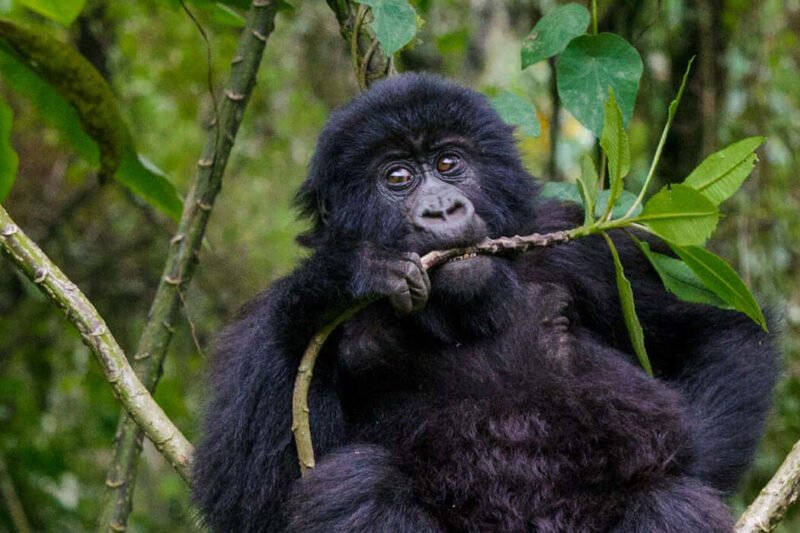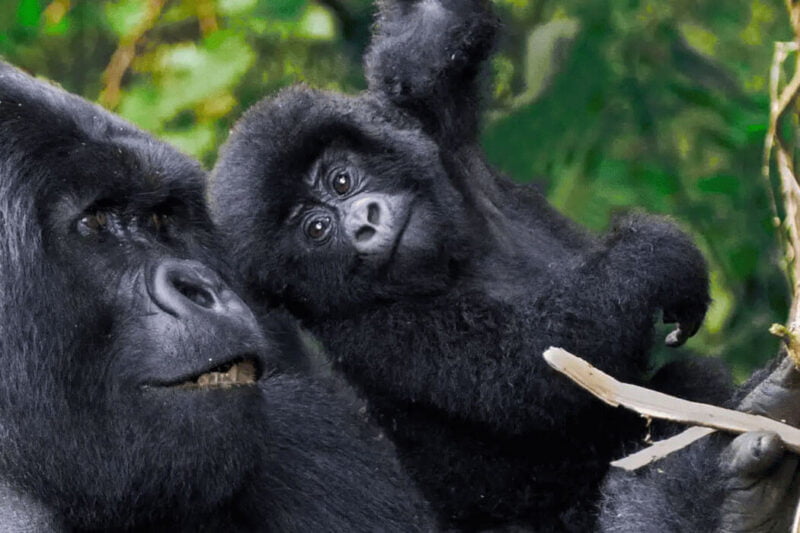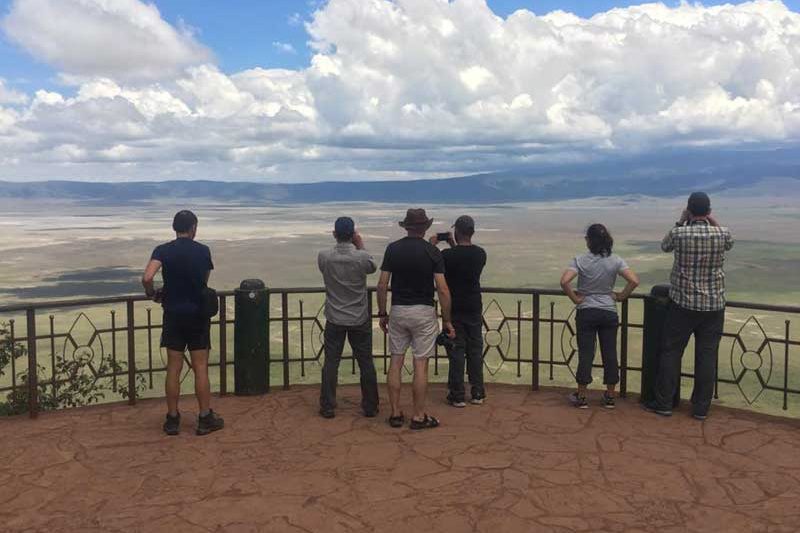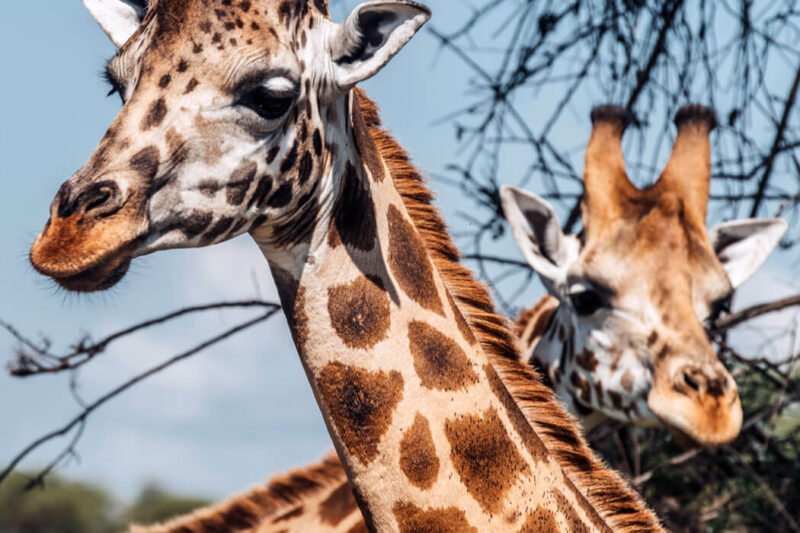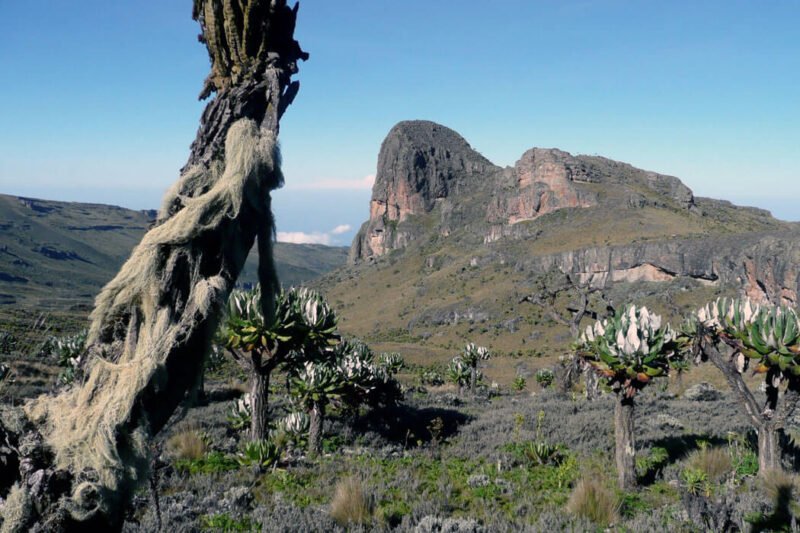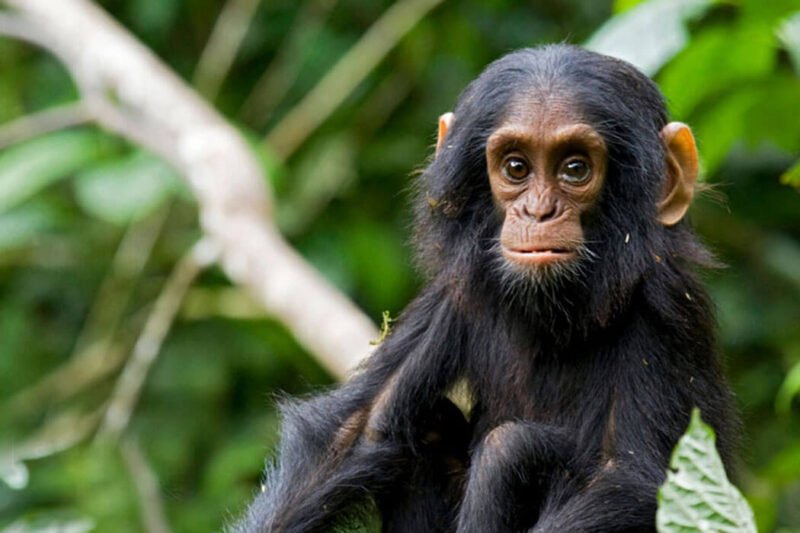What facts about hippos are you familiar with? Their eating, blood sweat, the temper or their ability to kill a lion in one bite? Hippos are much more than their looks and size might lead you to believe.
While Hippopotamuses might look like gentle and docile animals, they are one of the world’s most dangerous beasts. The more you learn about hippos, the more you will be intrigued by these huge beasts and their surrounding.
We have created a list of 35+ interesting facts about hippos. These hippo facts cover topics ranging from their habitat, diet, social set and how they manage to stay alive amidst predators.

Facts About Hippos
1. What do Hippos look like?
Hippopotamuses have barrel-shaped bodies with short legs and long muzzles. They have a graviportal structure that allows them to carry enormous weight on land and move along the river bed.
2. Are hippos mammals?
Yes. Hippos are mammals. Just like elephants, lions, humans, buffaloes and many other animals. Hippopotamuses are mammals because they are warm-blooded and have mammary glands.
3. What does ‘Hippopotamus’ mean?
The name hippopotamus comes from ancient Greek to mean “river horse”. Whether this is due to how they walk on the river bed – which looks like racing horses is why hippos are called river horses remains uncertain.
4. How wide a hippo can open its mouth?
A hippo can open its mouth to a full 150 degrees. This is important if the hippo needs to defend itself, or even scare away any other animals. Adult bull hippos will even come closer to 180 degrees.
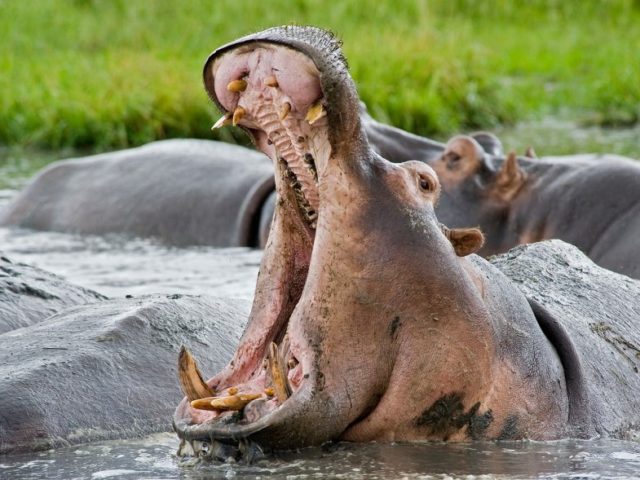
5. Why do hippos have long teeth?
A hippo’s lower canines and incisors are enlarged – especially in males and keep growing with age. The incisors can grow up to a length of 40 centimeters (1 foot, 4 inches) while the canines can reach 50 cm (1 foot, 8 inches).
Both these strong sets of teeth are used for fighting and have no role in their eating.
6. How much does a hippo weigh?
An adult hippo can weigh up to 4000 kilograms (4 tons). On average, an adult male hippo weighs between 1500 – 1800 kilograms. A female hippo weighs between 1300 – 1500 kilograms.
A male hippo keeps growing in size and weight, unlike the female whose size doesn’t change after a certain age. This is why a grown bull hippo can weigh upwards of 3000 kilograms.
7. Are hippos related to Pigs?
No. Hippos are not related to pigs despite the physical resemblance. Their closest living relatives are the cetaceans such as whales and dolphins. It is believed that they diverged about 55 million years ago.
8. How fast can hippos run?
Big as it is, a hippo can run at a speed of 30 kilometers per hour on land. It can move at about 8 kilometers per hour in water. This adds to the dangerous factor because it can very easily surprise and attack an encroaching human or predator.
9. What a group of hippos is called?
A group of hippos is called a dale, herd, pod or bloat. The most common way to refer to a group of hippos is by calling it a herd. The other terms might be a bit too technical for everyday conversation.
A group of hippos (herd/school) is made up of 8 to 30 individuals. In drier areas where the water source is small, groups of up to 100 might be seen together.
Such large groups usually have many power struggles and fights might be witnessed as the dominant bulls assert their power.
10. How strong is a hippo’s bite?
The bite force of a hippo is 2,000 pounds per square inch. In comparison, a lion or a tiger has a bite force of 1000 pounds per square inch.
This is why very few animals will dare to disturb a hippo’s territory, because a hippo will tear up most animals in a single bite. For further comparison, an adult human has a bite force of 200 pounds per square inch.
11. How do hippos mark their territory?
Hippopotamuses by defecation. They do this by spinning their tails to distribute their poop as far as possible. Hippos are only territorial in water, and a dominant bull controls a stretch of around 200 meters – with about 10 females.
Young bachelors can join a bull’s territory as long as they respect the hierarchy.
12. Why do Hippos stay in the water a lot?
Staying in water helps hippopotamuses stay cool from the strong African sun. A hippo’s skin is hairless, which means the sun and bugs are a serious problem to deal with.
13. How do hippos sleep?
Hippos sleep in the water by fully submerging their bodies. They automatically rise to the surface and breathe without waking up. Otherwise, they would have had to wake up every 5 minutes to breathe, and then go back to sleep for another 5 minutes.
14. What do hippos eat?
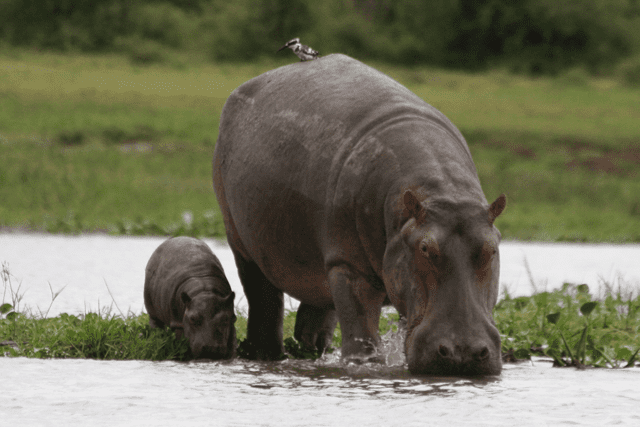
Hippos are herbivores that will graze on grass. Their main diet is short grass and some very few fruit species. Their digestive systems resemble those of other herbivores – with a few of their adaptions.
Read our updated article about what hippos eat for more insight into the food and eating habits of hippos.
15. Do hippos eat meat?
No. Hippos do not eat meat. The stomach structures of herbivores such as hippos and elephants cannot digest meat. Hippos do not eat any sort of fish or insects either.
While some cases have been noted and studied, the reason why a hippo would eat meat is unknown.
16. How much do hippos eat?
A single hippo can eat about 40 kilograms of food. Hippos graze for about 5 hours in the night and cover a territory of up to 8 kilometers.
17. What are young hippos called?
A young one of a hippo is called a calf. Same as the young one of an elephant or a cow. A male hippo is called a bull, and a female hippo is called a cow. Cows and hippos can be called by the same names for male, female and young ones.
18. How do hippos give birth?
Hippos give birth underwater because it is safest there. This is of course in shallow waters. After birth, the cow and calf hippos stay in water full-time for up to 14 days, without going out to graze.
19. What about blood sweat?
A hippo secretes some natural chemicals to protect its bare skin from the tropical sun. These two secretions are of hipposudoric acid and norhipposurdic acid.
Combined, these two chemicals are what is commonly referred to as blood sweat. Besides absorbing ultraviolet light from the sun, they also inhibit bacteria – thus preventing diseases.
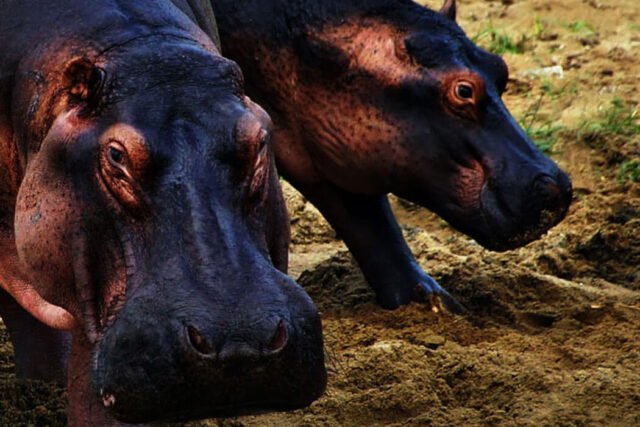
20. How long do Hippos live?
A hippopotamus can live for 40 to 50 years. To put this in context, this is more than 4 times the average lifespan of a lion.
21. How do hippos move in the water?
A hippopotamus moves in water by using its feet to propel itself forward. A hippo’s body is well adapted to move in water with ease. The facial features such as the eyes and nostrils are placed on the top of the head to allow for total immersion except for the eyes and nostrils.
22. Can hippos breathe underwater?
While Hippos spend an average of 15 hours a day in the water, they do not breathe when underwater. Hippos can hold their breath for more than 5 minutes when fully submerged.
They close their nostrils when they are submerged underwater.
23. Why do hippos fight each other?
Like with many animals in the jungle, fighting is the way to resolve issues. A dominant male hippo in a group (herd) will sometimes fight with other males who are disrespecting his authority or invading his group’s territory.
24. What do Hippos at the zoo eat?
In most zoos around the world, hippos are fed hay, alfalfa, herbivore mixes, and some watermelon. While they do not have watermelons in the wild, zoo hippos like watermelons.
25. Hippo vs lion, who wins?
In a one-to-one face-off, a hippo could end the lion’s life in a couple of minutes. Lions do however manage to kill a hippo by attacking it as an entire pride of several individuals. This is rare, as even the lions know the risk involved and won’t go after a hippo when they can grab an easy antelope for that day’s meal.
26. Do crocodiles attack hippos?
Under rare circumstances, a crocodile will attack a young hippo(calf). This is because hippos are stronger than crocodiles and can crush a crocodile with just one bite. Even if a crocodile were to attack a young calf, calves are always in the company of their mothers.
27. Why hippos are dangerous?
Hippos are aggressive and highly unpredictable. This is why they are considered Africa’s most dangerous mammal. They are even more dangerous when their young calves are involved.
A hippopotamus’ yawn or laugh is a serious warning signal, and there is nothing cute about it – much as it might seem so.
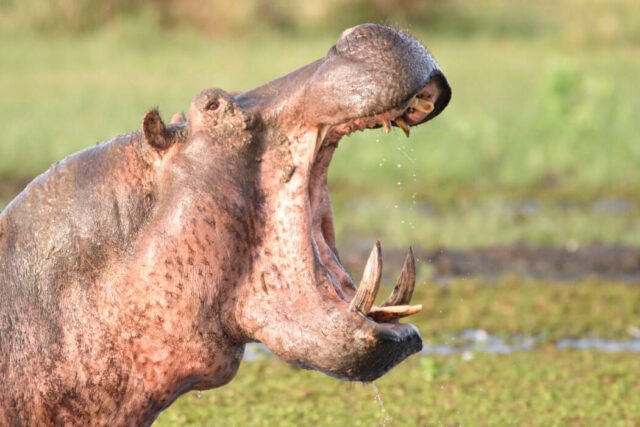
28. How dangerous are hippos?
Of all the wild animals in Africa, the hippo is regarded as the most dangerous to both humans and other animals. It is said that hippos kill more than 430 people every year. This is an average of 3 people every two days.
Most of these deaths result from invading the hippos’ territory or as they are trying to protect their young ones.
29. Are Hippos endangered?
According to the IUCN Redlist data, hippopotamuses are considered vulnerable. This is because if the circumstances threatening the survival of the hippopotamus don’t improve, it will become endangered.
30. How many hippos are left in the world?
According to the International Union for Conservation of Nature (IUCN Redlist), there are 115000 – 130000 common hippos left in the world. Eastern and Southern African countries represent a conservation stronghold for hippos.
31. How many hippo species exist?
There are only two species of the Hippopotamus. The pygmy hippopotamus and the Common hippopotamus.
There were other species of the hippo in various parts of the world especially Europe but they were all extinct from thousands of years ago.
32. What predators are there for a hippo?
While many carnivores (even birds) can eat a hippo’s meat, very few can kill a hippo on their own. Since a single bite from a hippo can crush a lion as if it is nothing, lions can only hunt a hippo in a bigger group.
Besides lions, the Spotted Hyena and the Nile crocodile are the other predators of hippopotamuses. Due to their size and aggression, adult hippos are rarely preyed on and the predators only target the young calves.
33. Why hippos are a vulnerable species?
Hippos are regarded as vulnerable species because the threats to their survival need to be improved before hippos become endangered and head on from there to extinction.
Among the Threats to the survival of hippos, are: Hunting, political unrest and war, Dams and water management, Drought, Habitat loss to agriculture and urban development.
34. How are hippos important for the environment?
Hippos help the environment by fertilizing the water with their dung. Their dung is full of nutrients that enable the growth of organisms that act as food for fish.
On land, they help clear up vegetation around the wetlands – which allows the ecosystem to sustain all its members.

35. Where do hippos live?
Hippos are found in many African countries with a suitable wetland habitat. Most countries below the Sahara desert have hippos. The population distribution in various places will vary based on many conservation factors of a given area.
36. Where can you see hippos in Uganda?
In Uganda, you can see hippos in several national parks, game reserves and lakes. You can see hippos in Uganda in the following places;
- Murchison Falls National Park; on the banks of the river Nile
- Queen Elizabeth National Park; on the shores of the Kazinga Channel
- Lake Mburo National Park; on the shores of Lake Mburo, and the other lakes in the park
- Semuliki National Park; on the banks of the Semuliki – before it joins Lake Albert.
The most popular way to see hippos in Uganda is taking boat cruises on either Murchison, Kazinga Channel or Lake Mburo where you can see them on the water shores going about their leisurely day.
Safaris to See Hippos
37. Which African countries have hippos in the wild?
Common Hippos occur in rivers and lakes throughout the savanna zone of Africa, and the main rivers of the forest zone in Central Africa. They can be found in Angola, Benin, Botswana, Burkina Faso, Burundi, Cameroon, Central African Republic, Chad, Côte d’Ivoire, Democratic Republic of Congo, Ethiopia, Equatorial Guinea, Gabon, Gambia, Ghana, Guinea, Guinea Bissau, Kenya, Rwanda, Senegal, Sierra Leone, Somalia, Sudan, South Sudan, Swaziland, Malawi, Mozambique, Namibia, Niger, Nigeria, Republic of Congo, Sierra Leone, South Africa, Tanzania, Togo, Uganda, Zambia, and Zimbabwe.
38. In which African countries are hippos extinct?
Hippos are extinct in Egypt, Eritrea, Mauritania, Algeria, and Liberia. These countries used to have populations of hippos that are not there anymore.
Conclusion
And that’s the list. Hippos are very interesting and seeing them can be such a spell-bounding experience. A docile-looking animal that is most dangerous in the savannah.
Which of these facts about hippos surprised you the most? Which one do you think would make the most memorable moment of your Safari?

